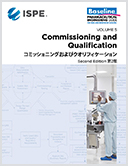Baseline Guide Vol 5: Commissioning & Qualification 2nd Edition

Published: June 2019
Pages: 212
The ISPE Baseline® Guide: Commissioning and Qualification (Second Edition) provides practical guidance on the implementation of a science and risk-based approach for the Commissioning and Qualification (C&Q) of pharmaceutical manufacturing facilities, systems, utilities, and equipment to demonstrate that they are suitable for the intended purpose. The process described in this Guide supports the application of science and risk management approaches, a focus on product and process understanding, and the application of Quality by Design concepts.
This Guide intends to offer a compliant, integrated C&Q approach to making the qualification process efficient and cost-effective. This approach includes a System Risk Assessment process that identifies Critical Aspects and Critical Design Elements. This Guide recognizes industry best practices regarding C&Q and presents concepts that can assist organizations in meeting current regulatory expectations for system qualification.
This Guide discusses key topics that are essential to an integrated C&Q effort, such as:
- How to apply Quality Risk Management to C&Q
- Best practices for User Requirements Specification, Design Review, Design Qualification, and acceptance and release
- Efficient use of a change management process to support C&Q
- Good Engineering Practice documentation standards
The intent of this revision to the Guide is to help the pharmaceutical industry simplify and improve the C&Q process by bringing the “best of the best” together into one document. This Guide also combines concepts from regulatory guidances (e.g., from EMA, FDA, ISO). Certain aspects of the C&Q approach described in the previous edition of this Guide are retired and replaced with Quality Risk Management and Good Engineering Practice concepts.
The ISPE Baseline® Guide: Commissioning and Qualification (Second Edition) replaces the following guides:
- ISPE Baseline® Guide: Volume 5 – Commissioning and Qualification (First Edition)
- ISPE Guide: Science and Risk-Based Approach for the Delivery of Facilities, Systems, and Equipment
- ISPE Good Practice Guide: Applied Risk Management for Commissioning and Qualification
Available in Japanese | |
| ISPE Baseline® Guide: コミッショニングおよびクオリフィケーション, 第2版 | |
 | Individual Download Member Price Non-member Price |
QRM C&Q Key Deliverables Examples
The ISPE C&Q Community of Practice formed a Task Team of industry SMEs to prepare example deliverable documents that apply the concepts presented in ISPE Baseline® Guide: Commissioning and Qualification (Second Edition). The example document packages include User Requirements Specification, System Risk Assessment, Design Qualification, and Acceptance and Release Report (excluding test scripts) for a Single-Use Bioreactor, Primary Packaging for a Tablet Blister Pack, and Secondary Packing of the Tablet Blisters. These examples are a supplement to those already included in the Baseline Guide Appendices.
The Quality Risk Management C&Q process establishes the focus for systems and equipment being suitable for the intended purpose and qualified to support PQ and PPQ (as applicable). It establishes the appropriate level of Quality oversight, through the preparation of these key deliverable documents, along with owner, SME, and Quality unit approvals. The formats shown in the example documents are suggestions for how to compile these deliverables. The example content, presented across the different documents, provides an approach that is efficient, repeatable, and error proof. The approach shown should be modified for use as directed by each company’s procedures and documentation practices.